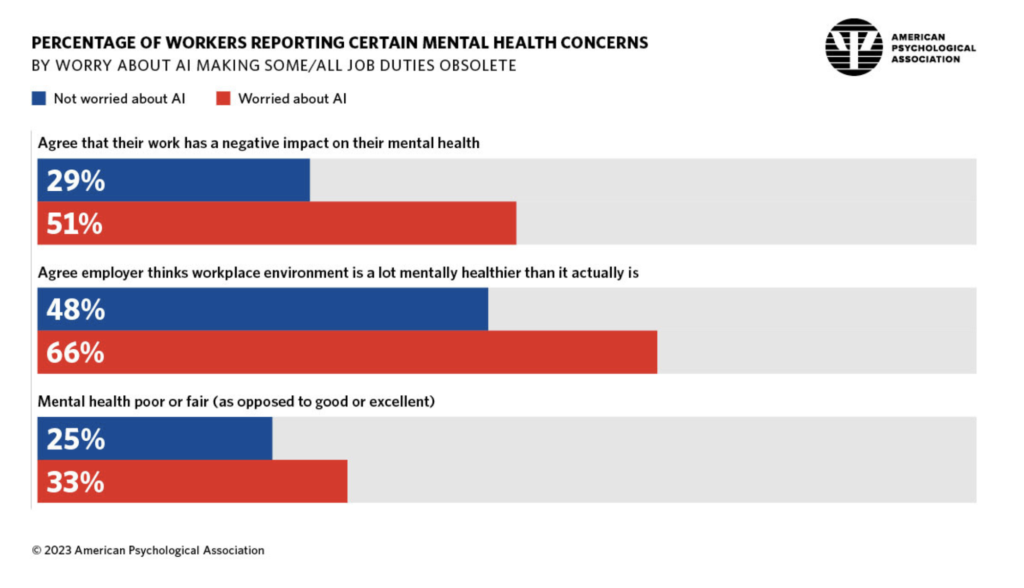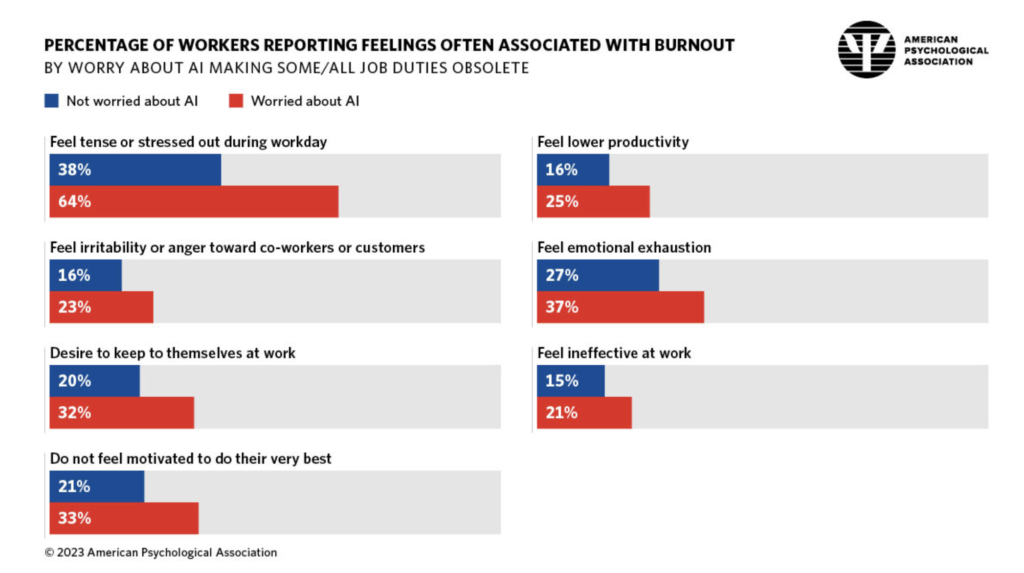With continuous advancements in technology, shifts in economic conditions, and evolving workplace cultures, the dynamics of the workforce are rapidly changing, and the momentum is relentless. There is growing apprehension among workers about potential job displacement arising partially due to technological advancements in the realm of artificial Intelligence, and others express unease regarding workplace surveillance and the potential invasion of their privacy by technology. According to data from the APA’s 2023 Work in America survey, these concerns are linked to psychological well-being. The findings indicate that individuals troubled by issues related to AI and monitoring technology in the workplace are more prone to report indicators of diminished psychological and emotional well-being. However, the survey does not confirm the exact origin of these feelings.
Approximately half (51%) of individuals expressing concern about the possibility of AI rendering some or all of their job responsibilities obsolete also indicated experiencing a negative impact on their mental health. This contrasts with 29% of those without AI-related worries reporting such effects. Similarly, among those apprehensive about AI (66%), a higher percentage believed their employer perceives the workplace as much mentally healthier than it truly is, compared to those without AI concerns (48%). Furthermore, 33% of those expressing AI-related concerns reported having poor or fair general mental health, as opposed to 25% of those without such worries, who rated their mental health as good or excellent.

Survey data also revealed relationships between worries about AI and stress as well as other negative feelings often associated with workplace burnout. Nearly two-thirds (64%) of those who reported being worried about AI possibly making some or all of their job duties obsolete also reported typically feeling tense or stressed during the workday, compared with over one-third (38%) of those who did not report being worried about AI. Compared with those who did not report being worried about AI, those who reported concern also more frequently experienced feelings at work that are often associated with workplace burnout, such as irritability or anger toward coworkers or customers (23% vs. 16% of those who do not worry about AI), a desire to keep to themselves (32% vs. 20%), not feeling motivated to do their very best (33% vs. 21%), feelings of lower productivity (25% vs. 16%), feelings of emotional exhaustion (37% vs. 27%), and feelings of being ineffective (21% vs. 15%).

Managing mental health in the workplace in the context of AI technologies is crucial for fostering a healthy and productive work environment. Here are some suggestions:
- Training and Education:
- Provide training sessions on AI technologies to help employees understand the changes and alleviate fears associated with automation.
- Offer workshops on stress management and resilience to equip employees with coping mechanisms.
- Communication and Transparency:
- Maintain open communication channels to address concerns and provide updates on AI implementation.
- Be transparent about the impact of AI technologies on job roles, emphasizing the potential for augmentation rather than replacement.
- Skill Development Opportunities:
- Invest in upskilling and reskilling programs to empower employees to adapt to the evolving job landscape created by AI.
- Establish a culture that encourages continuous learning and professional development.
- Work-Life Balance:
- Encourage a healthy work-life balance to prevent burnout. AI can sometimes lead to increased workloads, so it’s crucial to set realistic expectations.
- Promote flexible work schedules and remote work options to accommodate individual needs.
- Employee Support Services:
- Offer Employee Assistance Programs (EAPs) that include mental health support services, counseling, and resources.
- Ensure that employees are aware of available mental health resources and encourage their utilization.
- Social Connection:
- Foster a sense of community by organizing team-building activities, both in-person and virtually, to enhance social connections among employees.
- Establish support networks where employees can share experiences and provide mutual support.
- AI Ethics and Guidelines:
- Develop and communicate clear ethical guidelines for the use of AI technologies in the workplace to address concerns related to privacy and job security.
- Ensure that AI systems are designed and implemented with ethical considerations in mind.
- Leadership Support:
- Train leaders to recognize signs of stress or mental health issues in their teams and provide the necessary support.
- Encourage leadership to lead by example, promoting a healthy work culture.
- Regular Check-Ins:
- Conduct regular check-ins with employees to assess their well-being and gather feedback on the impact of AI technologies on their roles.
- Use employee feedback to make informed adjustments to policies and practices.
- Promote Diversity and Inclusion:
- Foster a diverse and inclusive workplace where employees feel valued and included, regardless of the changes introduced by AI.
- Emphasize the importance of diverse perspectives in developing and implementing AI technologies.
By implementing these suggestions, organizations can create a supportive and adaptive environment that addresses the mental health challenges associated with the integration of AI technologies in the workplace. Check out the report and for more workforce intelligence insights, subscribe at www.thedigitalhumanity.com or email contact@thedigitalhumanity.com.